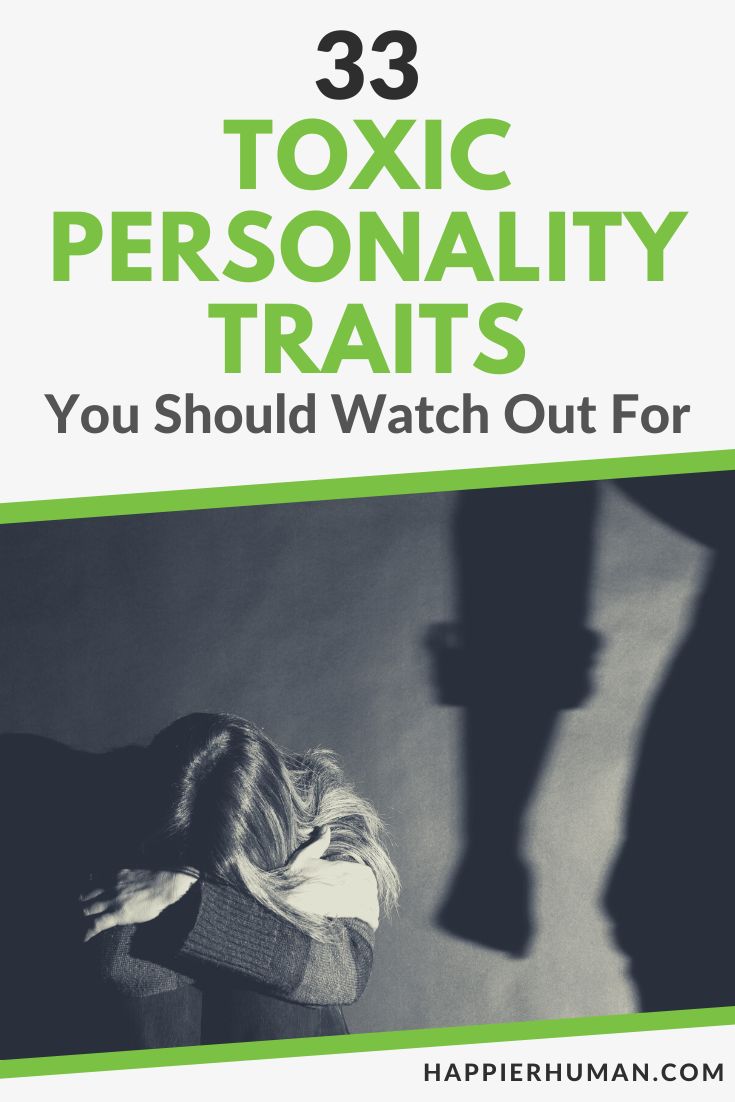There might be affiliate links on this page, which means we get a small commission of anything you buy. As an Amazon Associate we earn from qualifying purchases. Please do your own research before making any online purchase.
Toxic individuals are everywhere and are a common feature in close relationships. According to a study, 48.8% of men and 48.4% of women experienced psychological aggression (a toxic behavior) by a partner.
People display toxic traits at work, at home, in relationships, in the community, and online. So today, we will talk about how to spot 33 of those traits in yourself or others.
And here’s why this knowledge is important: Toxic behaviors are emotionally and psychologically damaging to the recipients. In fact, those with toxic personalities have difficulties establishing and keeping healthy relationships, for obvious reasons.
What Is a Toxic Personality?
A personality trait refers to the characteristics that reflect how a person thinks, feels, and behaves. These characteristics are innate, consistent, stable, and an integral part of who they are as an individual.
Personality traits are described as toxic when they cause physical, emotional, or psychological harm to others.
The Dangers of Being a Toxic Person or Recipient of Toxic Behavior
You'll know you've encountered a toxic person if their behavior is mostly negative and upsetting. They're known for stirring up drama. You'll notice that you often leave the conversation or interaction with the individual feeling emotionally exhausted. It's not unusual for them to traumatize you and bring out the worst in you in some cases.
Psychologists indicate negative behaviors might be the end result of dealing with their own stresses and traumas. They may not always be aware of how their actions affect you. However, the lack of self-awareness or emotional intelligence is no justification.
Ironically, both the toxic person and those on the receiving end are subject to the negative effects of their actions. Here's a glance at the risks if you're the antagonist:
You may be affected in the following ways if you're around someone with a toxic personality:
25 Toxic Personality Traits
Toxic traits can show up in your mother, father, child, partner, friend, or boss. Know that those personal attributes pose a danger to your mental health and well-being, regardless of who exhibits them. Watch out for these unmistakable ones.
1. Judgmental
Have you ever felt picked apart by a friend or loved one? To them, there's always something you don't say or do right. They'll overly criticize and make moral judgments about you, your family, friends, job, personality, and choices. Instead of seeking clarification, they assume and jump to conclusions.
That's not all the characteristics of judgmental people. They think whatever they say or believe is gospel. Explain all you want; they're not interested in your views. They'll even go as far as justifying their criticisms.
2. Controlling
Toxic people seek to exert and maintain control over others. It could be over just about anything from what you do, say, think, and feel to what friends you should have. Control freaks need to do this to feel superior. They'll insist on having things their way, don't take no for an answer or try to change you.

It's not unusual for them to criticize, intimidate, or threaten you whenever you push back. They'll go as far as ignoring your boundaries to ensure you comply with their never-ending demands.
3. Manipulative
Manipulative people are not easy to spot at first. That's because they disguise themselves as a “nice” person to gain your trust before revealing who they truly are Manipulators typically target and prey on the vulnerabilities of compassionate and empathetic people.
A classic manipulator is one called a “narcissist.” He or she will use manipulation tactics such as love-bombing to win your trust and affection, guilt-tripping to gain favors, and gaslighting to make you doubt yourself. Overall, people manipulate others as a way of exercising control and getting their needs met.
4. Argumentative
Do you find yourself frequently engulfed in an argument with a certain person, to the point where you fear engaging in conversations? You might be dealing with an argument seeker. They love to object and rebut what you say, as if to invalidate your opinions or make you feel not so smart.
People with argumentative traits are experts at turning the most trivial thing into a disagreement. They thrive on quarrels and conflicts and won't hesitate to blame you for causing a fight. You end up feeling emotionally drained from having to defend and explain yourself all the time.
5. Unapologetic
Some people quickly apologize for missteps that cause negative feelings in others. Not someone with this toxic personality. They'll refuse to say, “Sorry,” and rationalize their bad behavior when you call them out. They simply do not care about your feelings. You see, it takes courage, empathy, care, and character to let go of ego and admit fault.
Because toxic people tend to lack self-awareness, they're unable or incapable of acknowledging their mistakes. An inability to feel guilt, shame, remorse, or downright maliciousness may also explain why you almost never get an apology. If they do apologize, it's usually a half-ass, half-hearted apology.
6. Dishonest
Everyone fibs or engages in another form of dishonesty from time to time, e.g., withholding information. Its human nature and people sometimes do it to protect something important, e.g., their privacy.
However, a chronically dishonest person takes lying and deceit to another level. They lie by default. The psychological term for it is pathological lying, which often goes hand-in-hand with deceitfulness to cover up other lies and unscrupulous behaviors, such as cheating.
Dealing with a partner or friend with this trait can cause you to develop deep distrust or become cynical. You really never know when they're telling a lie or the truth. Don't be surprised if you start feeling paranoid.
7. Defensiveness
Defensiveness is an impulsive behavior that comes from low self-esteem or narcissism. I have someone in my family that has a defensive persona and is difficult to get through to. Defensive people have trouble with accepting honest feedback and constructive criticism intended to help not hurt.
If you possess this characteristic, you are likely to interpret these things as attacks on your personality or abilities. In other cases, you have difficulty holding yourself accountable and will launch into defensive mode to shield yourself.
8. Pretentious
Beware of those who pretend to be who they are not—sheep in wolf's clothing who are deceitful, insecure, and desperate for admiration. A pretensive individual will fake their personality and make you believe they're a kind, sincere, genuine, intelligent, or wealthy somebody.
Presenting a false persona is, in effect, a form of manipulation to bond with you before unleashing their true toxic self. Nothing good can come of your connection with a disingenuous person, since the entire relationship is built on pretense.
9. Narcissistic
Narcissists are people with an inflated sense of self-importance who exploit others. Three frequently used tactics of narcissists are manipulation, gaslighting, and trauma bonding. Trauma-bonding refers to creating painful situations that cause you to depend on and grow closer to them.
These selfish and unempathetic individuals lie, cheat, deflect, and lack accountability and self-control. They'll quickly shift blame to you for their poor behavior and won't hesitate to smear your reputation once they realize you're done with them (the ultimate discard).
10. Aggressive
Aggressiveness involves interacting with people in a hostile and threatening manner. It can be displayed as psychological aggression and physical assault. The article, Three Personality Traits of Aggressive People, refers to aggressors as confrontational, hot-headed, and thin-skinned.
They dominate and intimidate others to gain respect or control. If your friend, parent, or boss has this toxic trait, they'll likely raise their voice or issue threats to get compliance. The behavior is emotionally and psychologically harmful because it causes you to feel afraid or anxious. Dealing with a passive-aggressive persona can be just as harmful.
11. Vindictive
This is one of the vile toxic traits you need to know about, particularly because it can lead to harm. Relationships thrive when we're able to empathize and forgive, but not vindictive people. They have a memory like an elephant and hold grudges for a very long time. Instead of letting bygones be bygones, they're intent on payback.
Someone with a vindictive personality is quite calculating. They will plot to get back at you for petty things and perceived slights dating back months or years. Their mindset aligns with spitefulness and a strong desire for revenge.
12. Disrespectful
Chronic rudeness and disrespect are common reasons for family dysfunction, ruined relationships, and divorce. You'll most likely get fired for lack of respect for your boss or co-workers.
Examples of disrespect include showing up late, refusing to listen, disregarding the feelings of others, breaking rules, and breaching personal boundaries. People won't want to have anything to do with you because your traits convey that you don't care about their feelings, welfare, or workplace ethics.
If you're on the receiving end of gross disrespect and you don't assert boundaries, the individual will believe you lack self-respect and continue their behavior.
13. Victim mentality
Chances are you are in contact with someone who believes life dealt them a bad hand. If they're not complaining about problems after problems, it's about how no one loves or cares about them. People with a victim mindset want you to believe they're feeble and hopeless and may even threaten suicide to get your attention.
You'll eventually start seeing right through the facade. This is really their way of getting you to feel sorry for them and offer money or other forms of assistance. They'll start preying on someone else once you stop giving help.
14. Ignore boundaries
You have a good chance of having your boundaries crashed dealing with a toxic person. Disrespecting boundaries is a major red flag whether they're someone you recently met or have known all your life.

Setting personal boundaries is perfectly acceptable, as they help build respectful and meaningful relationships. However, boundary crashers continue to cross the “lines” established to guide their behavior towards you and your loved ones.
It's never too late to start setting and enforcing rules to protect your well-being from boundary violators.
15. Negative mindset
It may come as a surprise that having a negative mindset is one of the toxic traits to watch out for.
You or someone close to you have a negative mentality if they tend to have a gloomy outlook on almost everything. Something bad will happen or things are never going to turn out right. They're also prone to overanalyzing and catastrophizing or resisting chances for personal growth.
Chronic self-doubt and negative self-talk are other signs of a pessimistic mindset and can make confident, optimistic friends distance themselves. Be honest. Would you tolerate someone like this?
16. Abusive
Abusive behaviors are common in those who wish to maintain dominance, power, and control at home or in the workplace. The narcissist comes to mind, although anyone can abuse others. It doesn't matter if it's physical, sexual, psychological, or emotional abuse, it's still abuse and never okay to remain in relationships with the perpetrator.
You deserve and have a legal right to live free from abuse. Leaving an abusive situation safely can be challenging for some survivors. You can seek professional guidance 24/7 by calling the National Domestic Violence Hotline at 800-799-7233.
17. Jealousy
A jealous or envious friend or family member is bad news on any given day. Here's why. People who have your best interest at heart are usually happy when good things happen for you. For instance, when you get married, a promotion, a new job, or win a prize.
Don't get me wrong, envious people can act happy for you, but it's not genuine. You can sense the fakeness in their words and body language.
Nevertheless, this trait is considered toxic because these individuals tend to criticize, discourage, or give you bad advice to lead you in harm's way. Some will harm you themselves. Know your friends.
18. Competitive
Competitiveness can be healthy for success but can turn toxic when used as a tool to gain superiority, especially in close relationships. In general, envy and jealousy make coworkers, friends, and even your partner feel the need to one-up you. Narcissists, for example, are quite competitive with their partners.
Competitive loved ones or acquaintances may act this way because they feel threatened by your success. However, competing with you for selfish reasons is emotionally draining, since they won't let you enjoy the spotlight for your achievements.
They'll quickly jump in and talk about all of their accomplishments similar or greater than yours. Ughh!
19. Hide insults in humor
Has someone ever insulted you then laughed and said, “Relax, I'm just joking?” The derogatory remarks can also be disguised as sarcasm or backhanded compliments. For example, your boss says, “Hmmm, you performed surprisingly well” or your friend says, “You look pretty with your hair down.”
According to Psychology Today, these subtle insults “qualify as “toxic”, and can be emotionally and psychologically damaging. It doesn't matter if the person claims it's a joke.
20. Selfishness
Different from self-centeredness, selfishness is a tendency to excessively or exclusively put your needs ahead of others. Not only that, you don't care about their feelings. Everything is one-sided. If you can't benefit, you're not interested. These awful ways will push friends and loved ones away.
I recently ended a new friendship because the woman mistook me for an emotional dumping ground. It was all about her and I listened and empathized for hours. She never really showed concern for me when I told her I was sick.
She quickly said she had to go. I was left feeling used and discarded. She didn't value my time and displayed no empathy. Choose your friends wisely.
21. Lacks self-awareness
Self-awareness is a psychological trait that enables us to assess our thoughts, feelings, and actions (introspect). We can also reflect on how our behavior affects others and take steps to manage to improve.
Self-awareness acts as a guide for us to treat others the same way we want to be treated, e.g., with respect and kindness.
Those who lack this trait can be the source of constant drama, primarily because they're unable to see and take accountability for negative traits that hurt other people. Being self-aware can be difficult for some individuals, but techniques such as mindfulness can help.
22. Dismissive
I find it difficult to relate to anyone with a dismissive communication style. How about you? You'll find this trait in individuals who are emotionally unavailable or have a dismissive-avoidant attachment style.
Dismissive people do not prioritize closeness and intimacy, which can leave you feeling chronically dissatisfied with your relationship.
Dealing with you at arm's length is designed to avoid being vulnerable around you. On top of that, they fear conflict and have difficulty resolving disagreements in a positive way. They are more likely to engage in passive-aggressive behaviors such as giving you the silent treatment.
23. Gaslighting
Gaslighting is a tactic frequently used by narcissists and other types of manipulators. You might have heard the term before and this is what it means. When someone gaslights you, they're essentially doing and saying things to make you question your memory, reality, and sanity.
For example, they'll doubt what they said or did in the face of clear evidence. Not only that, the tactic is considered a form of covert psychological abuse. As I've already mentioned, abuse in any form is unacceptable.
24. Lacks empathy
Empathy is a natural ability to understand people's views and feel for them during adversity. An empathic boss will notice you're tired and tell you to take a break. A spouse or adult child might show empathy by preparing a meal for you or bringing you medication.

You can forget about being cared for if you're in the snare of an individual who has little to no empathy, such as a sociopath, psychopath, or someone diagnosed with narcissistic personality disorder (NPD). That explains why they can so easily manipulate and hurt you without giving a damn about how you feel.
25. Arrogant
You cannot get through to arrogant people. They know it all and will tell you that you don't have a clue what you're talking about. Someone like this who basically insults you by purporting to be more knowledgeable or aware than you are doesn't deserve your attention.
Don't try to explain yourself, they won't listen. In fact, they relish your comeback and may use it as an opportunity to create conflict.
26. Attention-seeking
Attention-seekers have a lot of insecurities and crave attention to feel better about themselves. The behavior shows up as bragging, a dramatic personality, or excessive postings on social media.
The need for constant attention is also driven by fear of being neglected, jealousy, difficulty validating themselves, or a personality disorder that has low self-esteem as an underlying issue, e.g., narcissism.
Grandiose narcissists, in particular, would sell their mothers to be the center of attention. When they’re not competing for the spotlight, they’ll fish for compliments to boost their self-confidence. By the way, did I mention that I have a master’s degree? Yeah. Top of my class. Uh-huh. That was an example of attention-seeking behavior. I'm still waiting for you to praise me for my intellect. Right. You get the drift.
27. Inflexible
You can’t get too far in negotiations with an inflexible and difficult person. In fact, good luck trying to get them to agree to anything. It could be a friend who doesn’t want to try something new or a spouse who is unwilling to change a decision that has potentially negative consequences. Inflexible people have a difficult time adjusting to changes that don’t suit them.
On a good day, they might listen to your ideas but be prepared to have them rejected. Inflexibility is linked to a desire to dominate and control what’s happening. In the work environment, your boss may appear rigid as a way of expressing authority and superiority.
The unwillingness of inflexible people to adapt even when it’s the proper thing to do can put a strain on their personal and professional relationships.
28. Self-centered
Self-centeredness is one of the hard-to-miss toxic traits since you’re going to be hearing a lot of ‘me’, ‘me and ‘I’, ‘I’. When it comes to self-centered individuals, such as narcissists, it’s all about their wants and needs. You’d be lucky if they ask how you’re doing. They either aren’t aware or don’t care about your needs.
To them, their feelings, thoughts, and opinions are the only ones that matter. You’re just a means to an end, whether it’s satisfying their needs or listening to them go on and on about themselves. Their lack of self-awareness and lack of reciprocity is such that they can’t see how their behavior is annoying and pushing people away.
29. Passive aggressive
Passive-aggressive behavior isn’t just a toxic trait but also one of the early red flags in a relationship you should never ignore. Unlike obvious aggressive behaviors, people with this toxic trait tend to not have the skills to assert their needs. Instead, they get angry internally and protest about unmet needs in passive ways. For example, they withdraw physically or emotionally, ignore you (silent treatment), engage in stonewalling, or withhold sex or affection.
It’s unfair for them to expect you to magically read their minds and figure out their needs. Withholding communication and otherwise lashing out in silence are unhealthy ways to manage their feelings and create problems in their relationships.
30. Condescending
A condescending person may brag about their abilities or accomplishments to make you feel small. They might ignore or dismiss you if they believe you’re beneath them or speak to you in a belittling manner. The attitude can stem from arrogance and low self-awareness. Jealousy and a lack of self-confidence could cause the behavior if they actually perceive you as the better person.
They’ll take digs at you using put-downs, sarcastic statements, and backhanded compliments. The fact of the matter is, they aren’t really emotionally intelligent. If they were, they would be empathetic and mindful of how they speak to you. Talking down gives them a sense of superiority, but inside they feel unworthy around you.
31. Explosive
We all get angry from time to time, but explosive or volatile people take things up a few notches. They can be highly sensitive (easily triggered) or quick to anger. Some volatile people work themselves up to potentially violent rage. Difficulty controlling the impulse to blow up and trouble regulating their emotions are contributing factors. Calming them down can be just as difficult.
Explosive personalities are seen in people with a cluster B personality disorder, such as borderline personality disorder (BPD). People with BPD are deemed hyper-reactive and tend to have unstable, intense relationships.
A friend or loved one with these personality traits could be a danger to your physical safety and mental well-being when angry.
32. Needy
A toxic parent, partner, or friend always needs something, from attention and money to endless favors. Otherwise, it's a problem they need help with or some form of emotional support when they're feeling down.
Neediness is an attention-seeking behavior on the surface. Beneath is chronic selfishness, lack of boundaries, and unfair and unreasonable expectations. It’s inconsiderate to expect you to meet their physical and emotional needs like a parent or caregiver. Not surprisingly, needy people are drawn to empaths or those who are naturally caring, compassionate, and helpful.
You’ll want to closely manage your relationship with this type of toxic person to avoid an unhealthy dynamic called co-dependency. Getting sucked into a codependent relationship with an excessively needy person means you’ll be doing the giving and they’ll be doing the taking. They’ll take all they can get, leaving you physically and emotionally drained and resentful.
33. Instigating drama
Wherever this person goes, drama follows, only because they bring the drama along. It’s safe to say that people who frequently create drama might be addicted to chaos. They get off on gossiping or saying mean and hurtful things, hoping for a negative reaction. Instigating conflict to get you or others riled up is harmful attention-seeking behavior.
For people who are attracted to discord, stirring up drama gives them a sense of euphoria. This happens due to the brain’s secretion of endorphins when the craving for negative attention is satisfied, according to Psychology Today.
Even worse, drama-seekers feel accomplished when you take the bait and get defensive or argue back. Lose or win, arguing can be exhilarating. Here’s one of my best toxic people quotes.“Negative people need drama like oxygen. Stay positive, it will take their breath away.” – Unknown
How to Deal with Toxic People
Cutting the person out of your life may not be practical, but you can still cope in the following ways:
Final Thoughts on Toxic Personality Traits
At some point, I'm fairly certain you've dealt with someone with at least one of these toxic traits. Being around a toxic person affects your happiness and peace of mind.
Distance yourself if necessary to protect your well-being. Conversely, if you're the one who possesses these negative characteristics, self-help methods and therapy can help you change the way you behave toward others.
Here are 65 Toxic Relationship Quotes to Free Yourself Today. It is a vicious cycle, but not one that can’t be broken with help and time.
Finally, if you want to identify YOUR personality type, then take one of these 11 personality tests to better understand what makes you tick.


